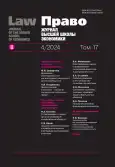Типология способов фальшивомонетничества
- Авторы: Печегин Д.1
-
Учреждения:
- Институт законодательства и сравнительного правоведения при Правительстве Российской Федерации
- Выпуск: Том 17, № 4 (2024)
- Страницы: 210-234
- Раздел: Российское право: состояние, перспективы, комментарии
- URL: https://journal-vniispk.ru/2072-8166/article/view/317731
- DOI: https://doi.org/10.17323/2072-8166.2024.4.210.234
- ID: 317731
Цитировать
Полный текст
Аннотация
Об авторах
Д. Печегин
Институт законодательства и сравнительного правоведения при Правительстве Российской Федерации
Email: crim5@izak.ru
ORCID iD: 0000-0001-6499-9966
Список литературы
- Gejvandov Ya. A. (2003) Social and legal basics of Russian bank system. Moscow: Avanta, 496 p. (in Russ.)
- Gorbunova O.N., Denisov E.R. (2007) Issues of regulation of money and its turnover in the Russian Federation. Finansovoe pravo=Financial Law, no. 8, pp. 2–5 (in Russ.)
- Kalatozi D.G. (2020) Liability in monetary circulation field. Finansovoe pravo=Financial Law, no. 11, pp. 38–40 (in Russ.)
- Khabrieva T.Y., Chernogor N.N. (2018) The law of digital reality. Zhurnal rossiyskogo prava=Journal of Russian Law, no. 1, pp. 85–102 (in Russ.)
- Kucherov I.I. (2016) Damage to money and counterfeiting: legal side of phenomena and liability. Zhurnal rossiyskogo prava=Journal of Russian Law, no. 1, pp. 107– 120 (in Russ.)
- Kucherov I.I. (2017) Elements of financial security and its legal support. Zhurnal rossiyskogo prava=Journal of Russian Law, no. 6, pp. 69–79 (in Russ.)
- Lyaskalo A.N. (2017) Money and securities as a subject of forgery. Zakony Rossii=Laws of Russia, no. 7, pp. 68–72 (in Russ.)
- Lyaskalo A.N. (2022) Financial crimes in Russian criminal law: modern concept and problems of qualification. Doctor of Juridical Sciences Thesis. Moscow, 650 p. (in Russ.)
- Molchanova T.V. (2020) Evaluation of crimes in the field of economy. Bezopasnost’ biznesa=Business Security, no. 3, pp. 36–40 (in Russ.)
- Nudel S.L. (2010) On liability for making, storage, moving or sale of counterfeit. Biznes v zakone=Business under Law, no. 1, pp. 99–103 (in Russ.)
- Nudel S.L. (2023) Modernization of criminal policy: issues of regulation. Zhurnal rossiyskogo prava=Journal of Russian Law, no. 1, pp. 5–22 (in Russ.)
- Obrazcova N.V. (2005) Liability for making or sale of false money or security bones. Candidate of Juridical Sciences Thesis. Moscow, 203 p. (in Russ.)
- Petryanin A.V. (2003) Liability for making or sale of counterfeit money or security. Candidate of Juridical Sciences Thesis. N. Novgorod, 221 p. (in Russ.)
- Ponomareva N.S. (2007) Issues of criminal qualification of counterfeiting. Rossiyskiy sledovatel=Russian investigator, no. 2, pp. 21–24 (in Russ.)
- Povetkina N.A., Ledneva Y.V. (2018) Fintekh and Redtekh: limits of regulation. Pravo. Zhurnal Vysshey shkoly ekonomiki=Law. Journal of the Higher School of Economics, no. 2, pp. 46–67 (in Russ.)
- Regulation of money turnover (2016) N.M. Artemov (ed.). Moscow: NORMA, 96 p. (in Russ.)
- Rozhdestvenskaya T.E., Guznov A.G., Efimova L.G. (2020) Private bank law. Moscow: Prospekt, 776 p. (in Russ.)
- Shurukhnov N.G. (2014) Subsequent stage of counterfeiting investigation: significance, tactical and technological bases. Rossiyskiy sledovatel=Russian Investigator, no. 5, pp. 13–17 (in Russ.)
- Tyunin V.I. (2019) Liability for using clearly false documents. Ugolovnoe pravo=Criminal Law, no. 4, pp. 103–110 (in Russ.)
- Volzhenkin B.V. (1999) The economic crimes. Saint Petersburg: Yuridical Centr Press, 312 p. (in Russ.)
- Yani P.S. (2016) Counterfeit security as a subject of counterfeiting. Zakonnost= Legality, no. 8, pp. 25–29 (in Russ.)
- Yani P.S. (2015) The qualification of counterfeit. Zakonnost=Legality, no. 2, pp. 20–24 (in Russ.)
- Yasinov O.Yu. (2006) Liability for making or sale of counterfeit money or securities bones. Candidate of Juridical Sciences Thesis. Moscow, 21 p. (in Russ.)
Дополнительные файлы








